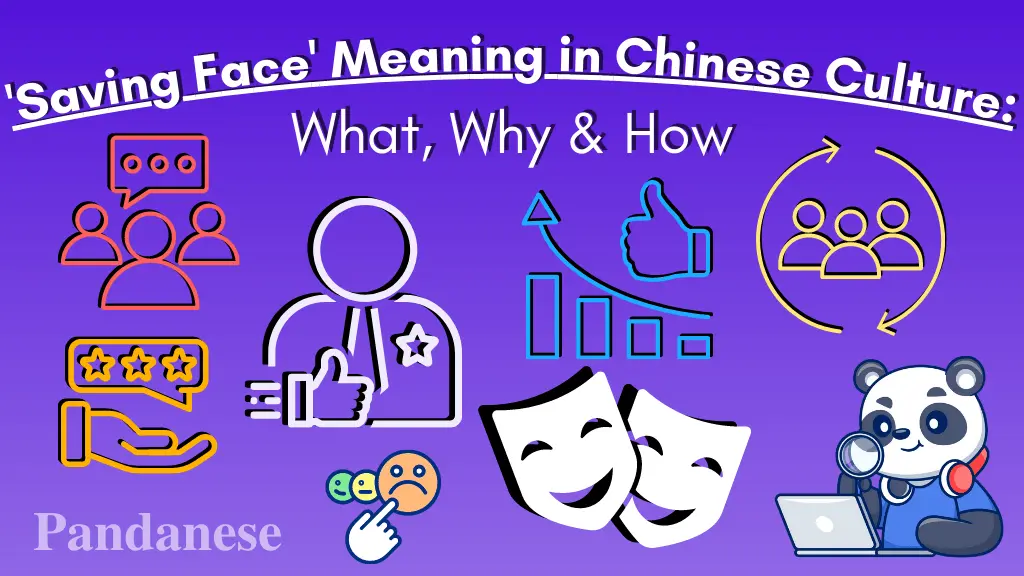
'Saving Face' Meaning in Chinese Culture: What, Why & How
Ever heard of saving face, but not sure what it means? Don't worry cause we got you covered.
The notion of 'saving face' is a long-established practice in Chinese culture. This concept is particularly important in social interactions and holds great significance today, given how interconnected it has become.
Continue to read on to learn everything that is to know about saving face in Chinese culture.
The overall Chinese concept of face:

Bowing as a sign of respect to your superiors and/or elders
Chinese culture's understanding of face goes beyond the common Western definition, incorporating honor and respect as integral components.
China takes into account notions of ‘honor’ and ‘dignity’ to avoid when referring to embarrassment or humiliation. 'Face' is an abstract yet significant concept that affects one's status among peers and profoundly impacts interpersonal connections.
1. What is the Chinese concept of face?
In Chinese, face or mianzi (面子) is strongly associated with a person's public image and honor.
Mianzi can be given or taken away depending on one’s behavior within their social circles. This concept permeates various life aspects, from business meetings to online appearances.
Understanding this concept from a foreign perspective is important if you want to study abroad or work in any Chinese-speaking country.
2. How do honor and shame play a role in Mianzi?
In Chinese culture, losing and gaining face are ingrained in everyday life.
To gain ‘face’ or respect from others, you must keep their dignity intact while also avoiding embarrassment and preserving dignity in yourself to not lose your social standing in your peer group or society.
China has embraced this concept tightly, using it as a self-regulating system to avoid embarrassment and negative repercussions should anyone fail morally: broken relationships, tarnished reputation, and compromised social status, outward appearances being some examples.
3. How do social hierarchy and relationships play a role in Mianzi?
Face plays a significant role in determining one's status within the hierarchy. Adhering to these expectations is crucial for navigating China's unique values.
Those higher in the social hierarchy, determined by factors like age, seniority, and social status, command respect and deference.
Conversely, those within the hierarchy are expected to display humility and obedience to those higher.
Failure to meet these expectations can result in loss of face, damaged relationships, and negative consequences in various settings.
Where did the concept of ‘face’ come from?

面子 or "miànzi:" the concept of “face” in Chinese culture; china-mike
Chinese culture is greatly shaped by Confucianism and its values, such as respect for elders, social harmony, and group orientation.
These beliefs remain strongly integrated within Chinese society today, with face playing an essential role in preserving the traditional hierarchy system.
Assessing these impacts can help us gain a comprehensive view of what “face” stands for in China and the implications that come along with it throughout this nation's history.
The role of Confucianism in mianzi
Confucianism developed the concept of filial piety—showing respect to your parents and elders.
Doing so helps maintain the family's reputation and social image and upholds the family's honor and prestige. Thus, saving face for them and their family.
This action is especially true in Chinese culture, as showing honor is essential in maintaining orderliness among members and good relations between the parties involved.
Mianzi in Chinese proverbs and idioms
The concept of face is a paramount one in Chinese idioms and proverbs.
Here are a couple famous Chinese familial idiom that incorporates mianzi:
Hanyu |
Pinyin |
English |
家丑不可外扬 |
Jiāchǒu bùkě wàiyáng |
"family ugliness should never be publicly aired" |
人要脸树要皮 |
Rén yào liǎn shù yào pí |
"men can’t live without a face, trees can't exist without bark." |
Both quotes emphasize the integral role of ‘face’ in keeping a certain social order and standing in society.
How is face used in everyday life?
It is essential to comprehend the concept of "face" in everyday situations. Knowing how to gain, maintain, and lose face is key to developing stronger bonds and relationships.
What is building and losing face?
Westerners may need to recognize how integral this idea is, and losing face can lead to disastrous outcomes for your reputation. It's imperative for anyone interacting with any native Chinese individuals to be aware of what "face" means for the relationship to run smoothly.
An example where mianzi plays an important factor is in work or government settings to maintain harmonious relationships and preserve social order.
10 common ways of losing face as a foreigner, CT JohnsonAnother example is when employees choose their words carefully and speak with humility to show respect to superiors and colleagues, uphold the hierarchy, and demonstrate their understanding of the importance of maintaining a positive image for the organization.
Similarly, organization members will prioritize collective reputation and act in ways that save face for their constituents or the entity as a whole.
This emphasis on mianzi helps cultivate a culture of respect, honor, and social harmony in professional and official environments while preserving everyone's dignity.
Gaining mianzi with gifts and compliments
In Chinese culture, gift-giving and compliments are ways of showing respect, establishing relationships, and gaining face.
To preserve dignity without causing shame or embarrassment to either party is to understand the cultural norms and act appropriately during social occasions
One way of saving face in Chinese business, J TalkPicking the best gift at the right time demonstrates your appreciation for the recipient, expresses your goodwill, and enhances your social standing and reputation.
Similarly, giving compliments in a public or formal setting preserves and boosts the mianzi of others by acknowledging their achievements, abilities, or positive qualities and yours for being able to recognize these qualities.
Losing face: humiliation and breaking social norms
One of the most common ways to lose face is from embarrassment.
From a gift-giving perspective, rejecting the gift can be seen as losing face as it implies a lack of appreciation or respect from the gift-giver. From the giver's perspective, you could embarrass them by not accepting their gift.
A face-saving resolution is to accept the gift while expressing sincere gratitude and appreciation, maintaining both parties’ dignity and face.
Additionally, failing to conform to cultural norms and etiquette, such as improper behavior, disrespecting elders or authority figures, or disregarding social hierarchies, can lead to losing face, especially if you are in any of those industries.
So a face-saving way is to educate yourself about Chinese cultural norms and etiquette to avoid these situations.
Why mianzi is important in Chinese business culture?
Maintaining face is crucial for building trust, establishing credibility, and fostering successful business relationships.
Thus, having a good reputation and positive image is highly valued, and losing face can have serious consequences in terms of damaging relationships, losing opportunities, and impacting one's social standing.
Upholding mianzi allows individuals and businesses to demonstrate their integrity, status, and ability to navigate social dynamics effectively, essential for long-term business success in Chinese culture.
Frequently asked questions:
What is guanxi and mianzi?
Guanxi or 关系 refers to social connections and relationships built on mutual trust, reciprocity, and mutual benefits. It’s about creating and maintaining relationships, both personal and professional, as a means of gaining support, cooperation, and opportunities.
Mainzi, or 面子, refers to the concept of “face” or maintaining one's social reputation, dignity, and honor. It involves preserving one's image and avoiding behaviors or situations that may cause embarrassment, shame, or loss of respect.
Learn these terms and more with Pandanese, the Chinese version WaniKani. It combines mnemonics and the SRS system to help you build Chinese vocabulary effectively.
How are guanxi and mianzi related?
The two concepts are interconnected as guanxi often plays a role in helping individuals maintain mianzi by leveraging their relationships to navigate social hierarchies, gain favors, and avoid potential loss of face.
What is an example of saving face?
An example of saving face in Chinese culture is when someone makes a mistake or encounters a challenging situation in a public setting.
Instead of openly criticizing or pointing out the mistake, others may address the issue indirectly or offer assistance discreetly.
Doing so helps the person involved maintain their dignity and avoid public embarrassment. This act of saving face allows individuals to preserve their reputation and social standing while resolving the situation gracefully.
In closing
To have successful personal and business level interactions and relationships with those from China, it is essential to be aware of the concept of face in Chinese culture. By looking into its background and exploring how this aspect plays out day-to-day life, we appreciate its uniqueness within its traditions. Understanding all these factors allows us to communicate more effectively when dealing with people living there so that bonds formed are more meaningful and long-lasting.
The easiest way to learn Chinese & build vocabulary

